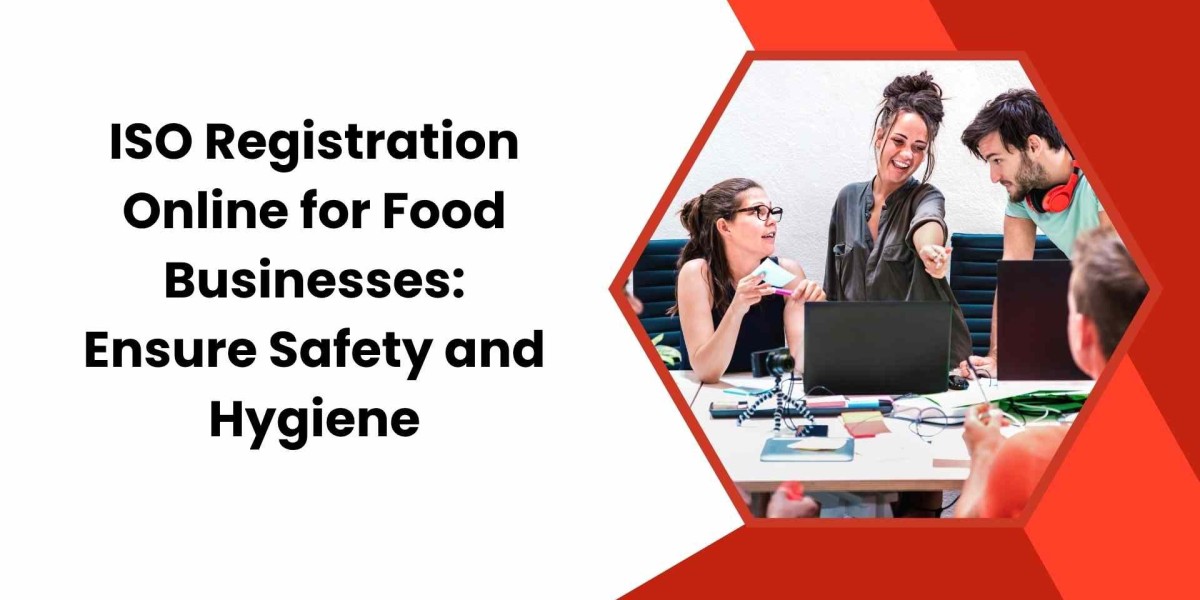In the food industry, where safety and hygiene are paramount, maintaining high standards is not just a regulatory requirement but a fundamental responsibility. Whether you run a restaurant, catering business, food processing unit, or packaged food brand, ISO registration plays a critical role in assuring customers of your commitment to quality. With the availability of ISO registration online, food businesses can easily achieve internationally recognized certifications that reinforce their reputation for safety, hygiene, and excellence. This article explores why ISO registration is essential for food businesses, the types of ISO standards applicable, the benefits of online registration, and a step-by-step guide to obtaining certification.
What is ISO Registration?
ISO (International Organization for Standardization) is a globally recognized body that develops standards to ensure the quality, safety, and efficiency of products and services across various industries. ISO certification for food businesses ensures that the organization adheres to specific standards related to food safety management, hygiene, and quality control. ISO certification demonstrates that a food business follows international best practices and complies with globally accepted safety protocols.
Why is ISO Registration Important for Food Businesses?
1. Building Consumer Trust
In the food industry, customer trust hinges on the quality and safety of products. An ISO-certified business signals that it meets international standards for food safety and hygiene, thereby increasing consumer confidence.
2. Meeting Legal and Regulatory Requirements
While ISO certification may not be mandatory, it complements regulatory certifications like FSSAI in India. Having both certifications strengthens compliance and reduces the risk of legal issues.
3. Enhancing Brand Reputation
ISO certification serves as a quality mark. It differentiates your business from competitors, attracts new customers, and enhances your brand’s image in both domestic and international markets.
4. Streamlining Internal Processes
ISO standards promote systematic processes, improving efficiency, reducing wastage, and ensuring consistent quality output. For food businesses, this translates to better production cycles, storage management, and service delivery.
5. Expanding Business Opportunities
With ISO certification, food businesses become eligible to participate in global trade, supply chains, and government tenders that mandate certified suppliers.
Types of ISO Certifications Relevant for Food Businesses
1. ISO 22000: Food Safety Management System (FSMS)
ISO 22000 is the most relevant certification for the food industry. It outlines the requirements for a comprehensive Food Safety Management System, ensuring safety from production to consumption.
Key Benefits:
- Reduces food safety risks
- Improves traceability in the supply chain
- Ensures compliance with legal food safety regulations
2. ISO 9001: Quality Management System (QMS)
ISO 9001 focuses on quality management principles, including customer focus, leadership, process approach, and continual improvement.
Key Benefits:
- Enhances operational efficiency
- Boosts customer satisfaction
- Promotes continual quality improvement
3. ISO 14001: Environmental Management System (EMS)
ISO 14001 helps food businesses manage their environmental impact, focusing on sustainable resource use and waste reduction.
Key Benefits:
- Reduces environmental footprint
- Supports sustainable business practices
- Improves compliance with environmental laws
Benefits of ISO Registration Online for Food Businesses
1. Convenience and Accessibility
Online ISO registration platforms simplify the process by allowing businesses to complete applications, submit documents, and track progress digitally.
2. Time-Saving Process
Traditional registration methods can be time-consuming. Online registration streamlines the procedure, reducing delays and minimizing paperwork.
3. Professional Guidance
Reputable ISO consultants offering online services guide businesses through documentation, audits, and compliance requirements, ensuring a hassle-free certification process.
4. Cost-Effective Solutions
Online platforms often offer competitive pricing packages tailored to small and medium-sized food businesses, making ISO certification more affordable.
Step-by-Step Guide to ISO Registration Online for Food Businesses
Identify the Suitable ISO Standard:
Determine which ISO standard best matches your business requirements and supports your long-term objectives.
Access the Certification Website:
Visit the official ISO certification portal to initiate your registration process.
Complete the Application Form:
Fill in the required information accurately in the online application form provided.
Submit Your Application:
Before final submission, carefully verify all the entered details to ensure correctness and then submit your application.
Make the Payment:
Proceed to pay the applicable certification fees after your form submission to continue the process.
Verification by Consultant:
An expert will review and confirm the ISO standard relevant to your business based on your application.
Get Your ISO Certificate:
Upon successful approval, your ISO certificate will be issued and delivered to your registered email address.
Challenges Faced by Food Businesses Without ISO Certification
Operating without ISO certification can expose food businesses to several risks:
- Lack of credibility in competitive markets
- Difficulty securing high-value clients or export opportunities
- Vulnerability to food safety incidents and legal actions
- Inefficient processes leading to increased operational costs
- Limited opportunities for growth and expansion
Tips for Maintaining ISO Certification in Food Businesses
1. Continuous Staff Training
Ensure ongoing education on hygiene, safety, and quality standards for all employees.
2. Regular Internal Audits
Conduct periodic internal audits to identify areas for improvement and maintain compliance.
3. Update Documentation
Keep your SOPs, hazard analyses, and safety records updated in line with evolving standards.
4. Stay Informed on Legal Changes
Monitor changes in food safety regulations to ensure your practices remain compliant.
5. Engage with Certification Bodies
Maintain open communication with your ISO certifying agency for updates and support during surveillance audits.
Also Read: You can also Apply for an ISO 9001 Certificate from our portal
Conclusion
In a sector where reputation hinges on safety and hygiene, ISO registration offers more than just a certification — it symbolizes trust, quality, and commitment. By opting for ISO registration online, food businesses can effortlessly position themselves as industry leaders, foster customer loyalty, and access new markets. Whether you’re running a small food startup or an established processing unit, obtaining ISO certification is a strategic move toward ensuring sustainable growth, operational excellence, and enhanced public confidence. Take the next step today — get ISO certified and make food safety your top priority.












